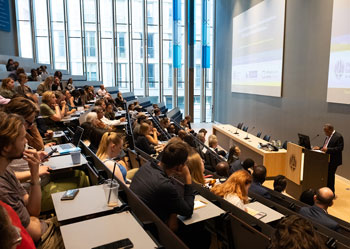News & Events
 Find the latest news below, and our event calendar on the right.
Find the latest news below, and our event calendar on the right.
Would you like to stay updated on our latest research news, publications and events? Please subscribe to our monthly newsletter!
Posted on 9 November 2011, last modified on 9 October 2023
10 November 2022
The collection of the African Studies Centre Leiden Library currently holds nearly 60 cookbooks, half of which are produced in Africa. The cookbooks published in Africa are often oriented at one specific country; those from outside often present recipes from all over the continent.
10 November 2022
09 November 2022
This book, co-edited by Rijk van Dijk, explores local cultural discourses and practices relating to experiences of the demonic, the spectral and the uncanny, probing into their effects on people’s domestic and intimate spheres of life. It contains case studies from sub-Saharan Africa, Latin America and Europe.
09 November 2022
For the Knowledge Platform on Inclusive Development Policies (INCLUDE) the ASCL is looking for a Knowledge Valorisation Staff member. One of the key responsibilities is to facilitate knowledge exchange between researchers, policymakers and other stakeholders in the Netherlands and African countries.
08 November 2022
The ASCL Library has created a list of online resources on Africa and the COP27 climate summit, taking place in Egypt from 6 to 18 November. It contains online articles, blogs, infographics, podcasts and videos, most of which are freely available.
07 November 2022
On 11 November 1952, Congolese writer, poet, novelist, playwright, essayist and storyteller Kama Sywor Kamanda was born in in Luebo, Belgian Congo. He was the founding president of the African Association of Writers. As a writer he subsequently produced a considerable body of literary work, including a dozen anthologies of poetry, several hundred stories, as well as several novels.
07 November 2022
04 November 2022
John Kegel has recently started at the ASCL as a postdoc researcher. For three years, he will be doing research into the colonial concessionary companies in sub-Saharan Africa from 1880-1960. 'One could state that most of the land in sub-Saharan Africa was owned by European companies.'

